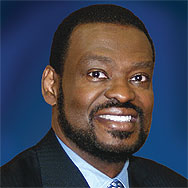
program at George Washington University. Not only was the course of
study designed to enhance the professional business skills of its
participants, it hoped to teach personal business and economics to
people vulnerable to personal financial failure.
Who were they? Astute cultural analysts? Children of single-parent
households? Convicted felons? People with learning disabilities? No,
one of the groups targeted by GWU was retired professional athletes,
especially those who played in the NFL. GWU understands something
that numerous political ideologues do not: Personal financial
management skills must be acquired if personal or business wealth is
to be sustained. In other words: “It’s one thing to make money,
but it takes skill and training keep it.”
Why would the academics target athletes and other professionals
with volatile incomes? The answer is simple: Moving from boom to bust
has landed scores of athletes and entertainers in the “poor house.”
After watching this year’s Super Bowl, it’s especially hard for
most Americans to say the word poverty in the same breath as
professional football or award-winning entertainment. Nonetheless the
tension between potential, passion and poverty is illustrative of
America’s current national financial dilemma. The U.S. is still the
richest nation in the world, but we are in danger of squandering our
blessed position of influence and our prosperity.
This fall both parties will advance their best approaches to
producing jobs, helping the poor and jump-starting our faltering
economy. Conservatives must translate their positions into practical
language. We need to give the nation a fresh vision and a strategic
game plan that will create an economic climate that is conducive to
economic opportunity; but simultaneously we also need to encourage
state and federal programs that help people learn self-control,
maturity and how to steward the money they have.
Please let me continue with the professional sports analogy for a
few moments. Despite their exceptional cash flow; just two years
after retirement, almost 80 percent of NFL players are bankrupt or
facing serious financial problems. There are numerous examples we
could dredge up in the NFL. Terrell Owens is the most recent one that
comes to mind. The phenomenally talented wide receiver admitted to GQ
this month that he is completely broke—despite making more than $80
million during his career.
A secondary problem for people in this realm of life is short-term
thinking. They often do not complete their bachelor’s degrees,
despite being awarded full scholarships to college. And when the
paychecks stop coming, they don’t know what to do.
For those who saw the exceptional movie Moneyball, they
will remember that the Oakland Athletics’ general manager began his
baseball career with a decision to give up a scholarship to the
prestigious Stanford University and a college degree. Later in life,
Billy Beane regretted putting money ahead of his long-term career
development. This decision was a major aspect of the movie.
Fortunately, he learned how to make wiser decisions as he went
through life and became a major strategic force in the entire
industry.
In contrast, too many of us don’t take ownership of our bad
decisions. Again Terrell Owens is a great example of the reason for
national financial woes. In his GQ interview, he never took
full responsibility for his situation. Instead he blamed his advisers
and the four women with whom he fathered illegitimate children.
So how do we get out of this mess? I have discovered some answers
as I look back at my own family’s history. Like many blacks, my
grandfather rose out of post-slavery poverty without the aid of
government “poverty programs.” With only a second grade
education, he led our family into several generations of prosperity.
There were three crucial ingredients to our journey from poverty:
1. Entrepreneurship
2. Military service
3. Education
If you go far enough back in the ancestry of the overwhelming
majority of successful blacks today, you will see many combinations
of these three elements. Why?
Of course the military was one of the few organizations willing to
hire and promote blacks in the first half of the 20th century.
Secondly, starting one’s own business is always an avenue to wealth
creation for individuals who don’t own land. Thirdly, education has
been the great equalizer for many ethnic groups in our land.
The difference between working your way up through the military
ranks or building your own business versus playing in the NFL is that
you learn vital skills on the journey. Military service and
entrepreneurship teach leadership, responsibility, self-discipline
and risk assessment, all of which are vital to protecting and growing
wealth. In addition, education gives a universal frame of reference
for excellence and often opens multiple industry opportunities.
Real solutions are necessary for black economic recovery to occur.
The highest unemployment rate in the nation is among blacks. Black
men are in dire need of additional help with primary school
education, prison rehabilitation and retraining. Unfortunately,
governmental solutions for poverty cannot provide the tangible
support and accountability that family members and faith-based
organizations can.
This year, conservatives with an urban agenda could bring real
hope to all of our minority communities. Let’s make it happen!
Bishop Harry R. Jackson Jr. is the senior pastor of Hope Christian Church, a 3,000-member congregation in the
Washington, D.C., area. He is also the guest editor of the January-February 2012 issue of Ministry Today about social transformation.









Leave a Comment
You must be logged in to post a comment.